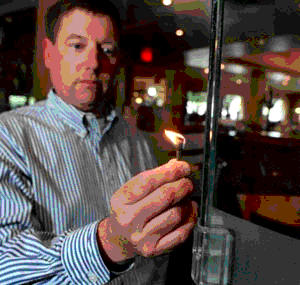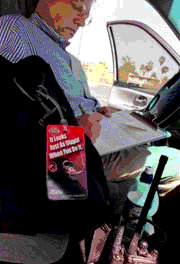It doesn't apply if most revenue is from alcohol
Saturday, 8 April 2000
Photos by Benjie Sanders,
The Arizona Daily Star

Skip Woodward, a detective with the Tucson Police Department, does an airflow test at City Grill. A customer has complained that smoke from the bar was blowing between the windows and into the eating area.

Detective Woodward does about 100 restaurant compliance checks a month.
By Sara Hammond
The Arizona Daily Star
Where there’s smoke in a Tucson restaurant, there’s not necessarily a violation of city law.
Something that looks like a restaurant may actually be a bar, at least when it comes to enforcing the six-month-old ordinance banning smoking in city eateries.
“It’s confusing,” said Tucson Police Detective Skip Woodward, a member of the special investigations section and the man charged with making sure the restaurant smoking ordinance is followed. He gets most of his tips from people who have seen others smoking.
One place he checked out was Chuy’s Baja Broiler at East Speedway and North Country Club Road. The place is considered a bar, because more than 50 percent of the revenue comes from alcohol sales. But some Chuy’s outlets are considered restaurants because they sell more food than alcohol.
Same goes for the Famous Sam’s establishments within the city limits, Woodward said.
Speedway Chuy’s manager Chris Evenson doesn’t have to, but he asks patrons to limit smoking to the bar area and outside on the patio.
The city began encouraging businesses March 20 to voluntarily comply with the smoking law, said City Prosecutor Laura Brynwood.
“We’re finding there is some misunderstanding,” Woodward said.
It extends to business owners who aren’t sure how to interpret the law, and to patrons who are seeing and reporting smoking incidents.
The owners of bustling Bison Witches on North Fourth Avenue thought the place could be considered a bar after the kitchen closes at 10 p.m. Woodward informed them that the ordinance considers total revenue, not serving hours, in determining whether a business is a restaurant or bar. It can’t be one for part of the day and another later on.
In a visit to City Grill on East Tanque Verde Road on Thursday afternoon, Woodward explained to the restaurant’s management why he was there: Someone had complained to police that a glass-paneled barrier between the designated smoking area in the bar and the rest of the restaurant was allowing smoke to pass through.
Manager Tamera Potter explained that the area had been remodeled before the smoking ordinance went into effect last fall. The air system’s pressure forces air from the restaurant into the bar, and then it is exhausted from the building. She provided Woodward with the name of the architect who designed the system for confirmation.
Woodward held burning matches next to the gap and saw the flame tilt toward the bar area.
Woodward said he’ll forward his findings to George Bromley, chief assistant city prosecutor, who will decide whether to pursue the matter with a letter to the owner, Metro Restaurants. Woodward said he’ll write in his report that it appears the restaurant is in compliance with the city law.
“I’ve been pretty well received everywhere I’ve been,” Woodward said. He is making about 100 compliance checks a month at restaurants.
“My job is tobacco control. If people want to get into compliance, we’ll help them get into compliance,” he said. “We’re not trying to shut down businesses. It really is a health issue.”
One local restaurant, Molly G’s, has been cited for violating the smoking ban and is appealing the citation. Woodward said The Grill, at 100 E. Congress St., also has received a letter from the city asking it to comply with the law or face civil penalties.